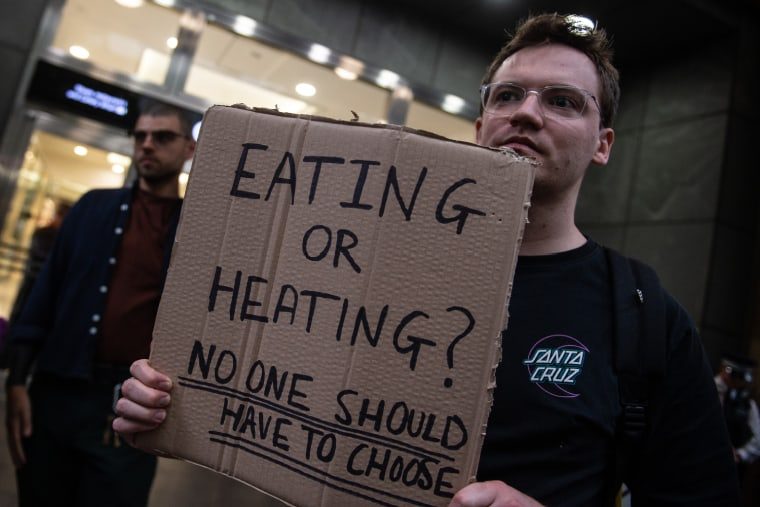Image Credit: Guy Smallman
Max Mosley is an economist working at the National Institute of Social and Economic Research (NIESR), Britain’s oldest economic think tank. The NIESR is known for using macroeconomic models to forecast GDP, inflation, and other economic indicators. In aggregate, the institution focuses on macroeconomics, microeconomics, and public policy, and conducts social research. Mosley’s work focuses on linking the macroeconomic picture with the household level. We sat down with him to talk about the current state of the British economy and his original proposal for a variable energy price cap to help solve the cost-of-living crisis.
CD: We are in a cost-of-living crisis with very high inflationary pressures on consumers and households, while the financial markets are in turmoil. What is the current state of the economy?
MM: We gave a press conference recently which gave a summary of where we think the economy is. We started from the position of saying that there is no indicator or no variable that we look at that is positive right now. It is not really a question of good or bad, but now it is swinging so far towards the latter that it is hard to keep up.
To give a brief overview, with inflation being this high, driven mostly nowadays by high energy prices and hangover effects of previous supply chain shortages, any supply constraint is a significant challenge for policymakers and the economy as a whole; typically, because policymakers cannot do much to increase the capacity of the economy. They can only really change how much people are active within it. However, that is not really very helpful when supply chains are this constrained, and energy prices are this high.
Staying at the aggregate macroeconomic picture, you have GDP constraining and coming down further and further because of households having to constrain spending and because of firms not being confident enough to invest in long-term capital development and expanding their companies. Inflation does bring down GDP and that is what we are experiencing now. As inflation gets worse, we are heading towards a recessionary state which is becoming more and more certain.
CD: You recently co-authored a paper titled “A Variable Energy Price Cap to Help Solve the Cost-of-Living-Crisis.” What is the core thesis of your proposal?
MM: Starting from the position that the goal of any energy policy right now should be to lower the bills of the poorest households, because energy bills naturally take up the greatest proportion of their budget. Moreover, it is an area in which any household cannot really reduce its energy consumption without adverse consequences. Therefore, the goal is to try and make it cheaper for those more vulnerable households.
There are several ways in which you could do that, and the government have gone for an imprecise measure, which is just to reduce the cost of energy for everyone. Administratively, that is straightforward, but it is also incredibly wasteful because reducing the energy bills for the richest households as well, who use a lot of energy, therefore making this policy very expensive. If policies are expensive, they are not necessarily that effective, because you cannot take the energy prices down any lower, as it will cost the government more money. Essentially, the government will run out of money before you reach energy prices that really help those lowest-income households.
There is a big challenge for the government which we must appreciate; when saying the policy is not targeted enough, the government should have lowered energy bills further for the lowest income households, the government will come back and say that it is not possible, because how do we, or energy companies who provide the energy, know who the lowest income households are? Moreover, how do we genuinely create a system in which the bills for the lowest-income households are lower?
We say that the energy companies do have data on how much income the households generate because income and energy consumption correlates nearly perfectly. If you put energy bills over income distribution, you see a linear increase in usage as income increases. Our point is, if higher-income households are more likely to use more energy, it makes sense to therefore increase the price of energy per unit for these households. The proposal works very similar to a progressive tax system, which means that the more you earn, the more taxes you pay. Similarly, the more energy you consume, the more you pay for the energy.
When we did our analysis, we found that we could lower the energy prices by 70% for the lowest income households (which would take them to where they were before the energy crisis) and raise them by 70% for the richest, at the extreme end of the spectrum. The hill that this idea would die on would be the exceptions to the rule, such as those people who are high energy usage households, but low income. That is possible, for instance, if you have a large family, for people that are disabled and have energy-intensive equipment in their household, or if you are in colder parts of the country. You would be identified as a high-income household by the energy company because you consume a lot of energy and that would be a problem. Therefore, most of the paper is trying to work out to what extent that is true and coming up with these extreme cases. Our analysis found that there are people who will fall through those cracks, as they might be mistakenly identified as high-income because of their disproportionate energy use.
Our view, however, is that it is much easier for the government to focus their spending on identifying low-income households, rather than paying for everybody to have lower energy bills. That is a much easier and much cheaper task. For instance, if you have a lot of children, and you consume more energy, the government could change child benefit payments. You could also do this through personal independence payments for disabled people, or by giving cash to local authorities in colder parts or regions. These are all ways in which you could catch the guys who are falling off the edge of the plate, rather than trying to catch them all in a bucket, which is the analogy I use for describing what the government plans on doing. Therefore, we think it is a much easier task for the government to focus on those guys who are falling through the cracks (low-income households mistakenly identified as high-income), rather than focusing on everybody. We have not calculated the total cost of this proposal, but it is already clear that it would be extraordinarily cheaper for the government and likely more effective for lowering the energy bills for those who need it the most.
There are good ideas out there, but it is a question of the government being willing enough to try and find them rather than doing what is simple and available at the time. We are always down ready to offer the same advice to the government. There are other proposals as well, and it is quite clear that there are a lot of ways in which you could do this in a much cheaper way than what they have gone for. We must remember that the cost of their approach is 150 billion pounds plus. Moreover, if energy prices increase further that gap also gets bigger and it must get filled because it is the path they have chosen. To put this into context, the furlough cost 70 billion pounds and we like to think of that as the most expensive public policy prevention in a generation – this dwarfs that by quite a significant margin. Therefore, this is not a question of cost-effectiveness or value-for-money, but this is quite an intrinsic issue that is going to define us for the next couple of years and is already defining us now.
CD: How would you respond to someone who says: This proposal is unfair because in absolute terms rich households pay the most in energy, but in relative terms, they pay less or the least. Why should they pay more? I suppose this would be quite a natural response from politicians and policymakers. How would you respond to that argument?
MM: The inconvenient answer that people don’t want to hear and don’t want to say is that nobody is going to come out of this better off than they really were before – this is very unlikely in terms of households. We are all experiencing pain. Those guys at the top end are currently the only exception to the rule. They are very likely to be those, according to previous analysis that we have done, which are still saving in this scenario, whereas most other households are not saving. We rely on the principle, that almost all advanced countries adopt that those with the broadest shoulders take the biggest amount of weight. Unfortunately, this means that people need to contribute in their own way. If there are people winning in a scenario where the world around them is crumbling it is right that we are all in this together.
Let us get into the numbers of this. How much does the energy bill increase for a rich household? We are saying they are going up by 70% at the extreme end. What does that mean in terms of their income? It means that they were previously spending 2% of their income on energy, and they are now spending 3%. In terms of cash, it is a lot, and in terms of what bills they were paying it is a lot, which means it is helpful for the system we are talking about here. But with regard to their material wealth, it is negligible. This is exactly what policymakers try to do, they try to equalise burdens and right now, there are people who have a huge capacity for shouldering pain, and yet they are also the ones who don’t need to. So, it is high time that we make sure this is equalised across the economy and that is the only fair way in which you could deal with this crisis.
CD: Could you please summarise what key strategic initiatives the new government should take? Specifically, focusing on fiscal policy. If you could give them a handful of things to focus on, what would they be?
MM: We have two messages for the government right now. With regards to policies on the demand side, the only way in which you could really do something is by increasing distributional outcomes. Our usual recommendation when it comes to supply-side approaches is public sector investment as the main lever. Usually, the gains from that are both short and long-term, so sometimes you actually get a demand-side effect in the short run and a good positive effect on supply and debt in the long run. Those are the ways in which we usually expect this policy to manifest itself within the economy. Our view is that that just so happens to fit very neatly within government priorities of growing the economy in the short run and supply in the long run. We think, however, that it really comes down to public sector investment. Those are the ways in which we would approach the criteria for policy right now.
CD: Thank you very much for the interview and for taking the time. It has been very insightful!
MM: Thank you very much!
Max Mosley’s recommendations come at a time that is challenging for people across the UK. Being faced with increasingly high energy costs and consumer goods prices, households are under immense pressure. The new government has inherited the burden of bringing down inflation and solving the cost-living crisis, which represents a remarkable task. We hope that Mosley’s analytical depiction of the British economy and his actionable recommendations with regard to energy costs have given clarity and understanding to our readers.






0 Comments